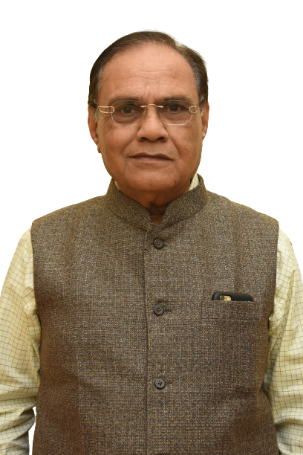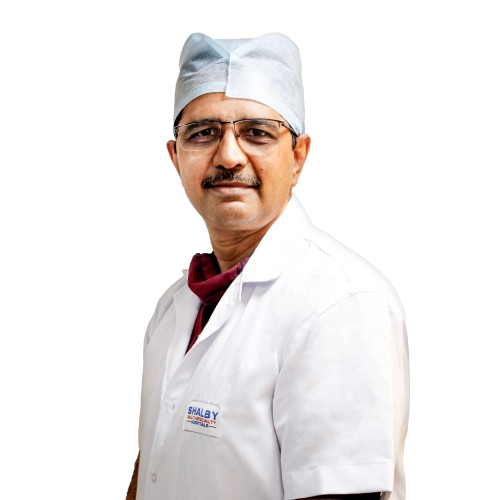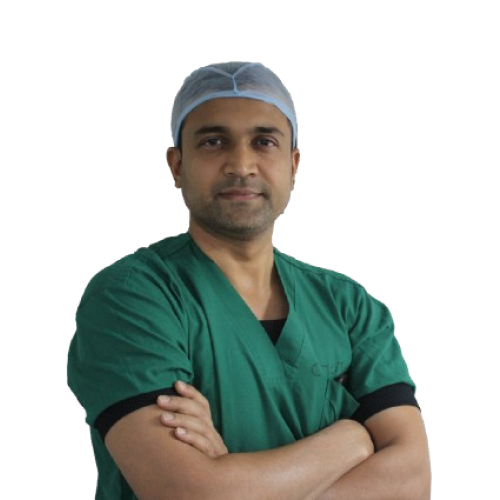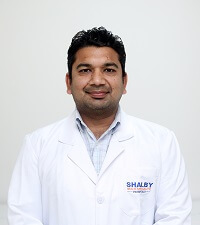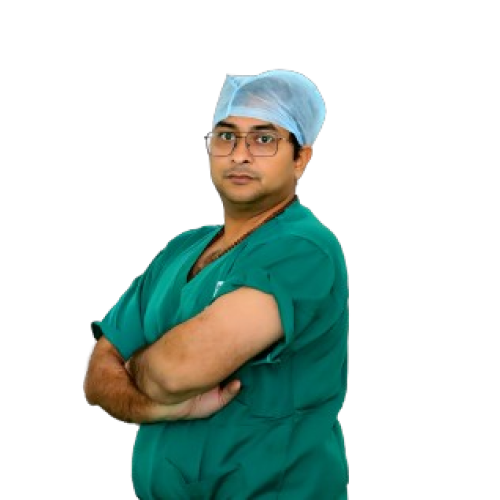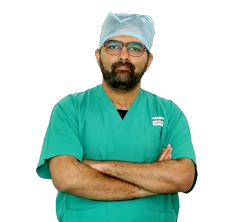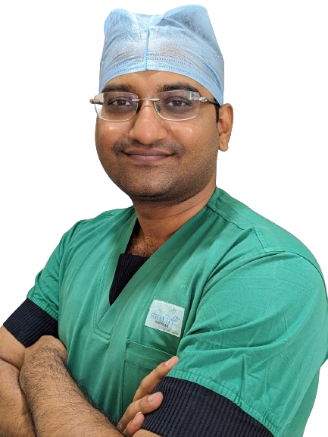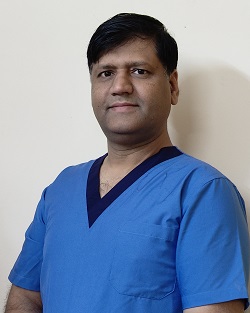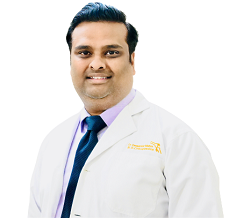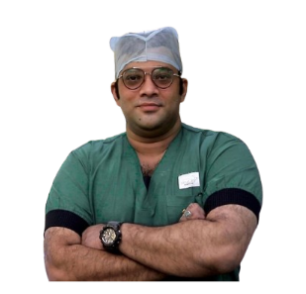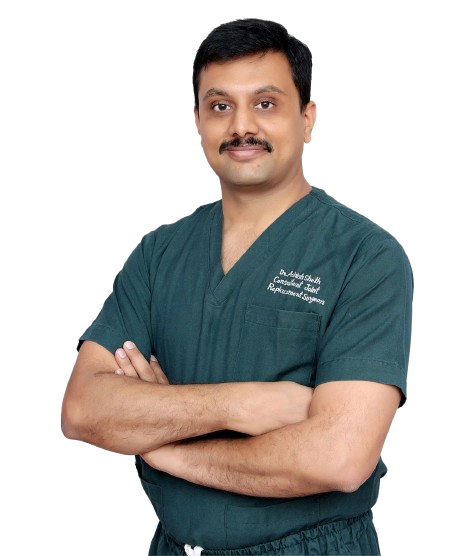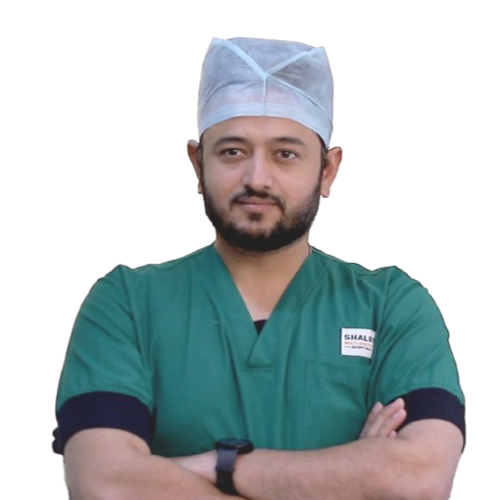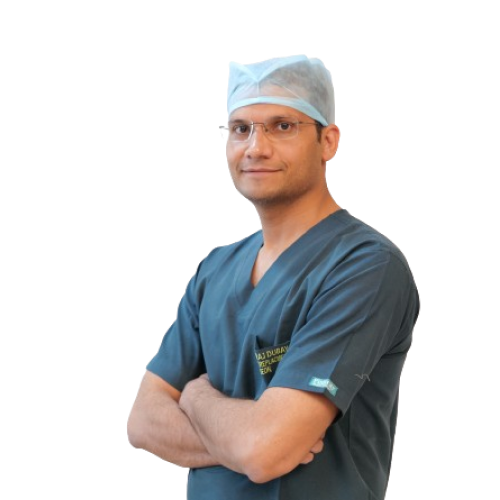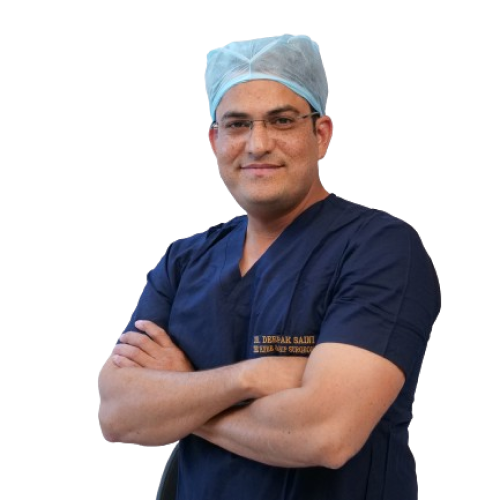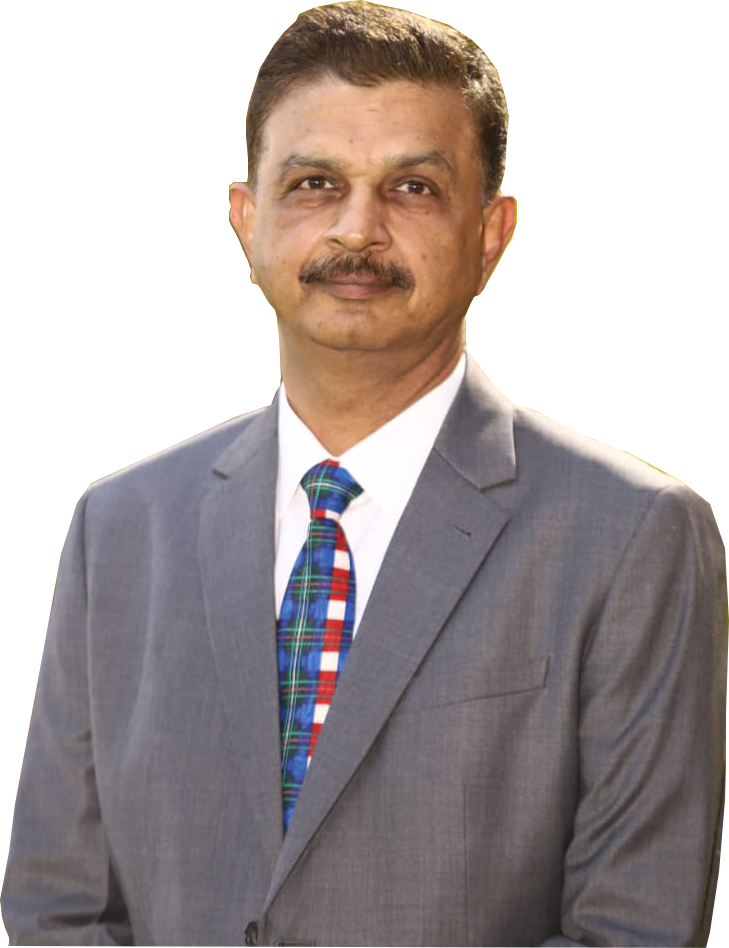Knee Joint Replacement
Shalby Hospital is the global leader in Knee Replacement. Shalby is one of the world's best and renowned knee replacement hospitals with highly qualified knee replacement surgeons and a trail of success stories in knee replacement surgery.
A visionary and the founder of quality health services establishment – Shalby Hospitals, Dr. Vikram Shah’s name is closely associated with Knee Replacement Surgery. Inventor of the OS needle used by orthopaedic surgeons worldwide, Dr. Shah brought laminar air flow and body exhaust systems in the OT for the first time, to perform knee joint replacement surgery in India. He established the first Indian hospital with a ‘Class 100’ operation theatre, making knee replacement surgeries much more safe and successful.
Today, Shalby Hospital is considered as the best Knee Replacement Centre in India.
Dr. Vikram Shah’s Glorious Achievements:
- Dr. Vikram Shah is a well-known name among the medical fraternity and is recognized across the globe for developing the ‘OS Needle’, a breakthrough technology used in Orthopaedics.
- Dr. Vikram Shah is credited with the innovation of ‘Zero Technique’ – a surgical innovation which revolutionized Total Knee Replacement Surgery (TKR) which reduces the surgical time from hours to just minutes.
- Dr. Vikram Shah received ‘B. C. Roy International Award’ in 2003 for his work on Joint Replacement Surgery.
- Dr. Vikram Shah is the first and only Indian doctor on ‘The Board of Designers of Zimmer Inc., U.S.A.’, world leaders in producing artificial human prostheses.
- Dr. Vikram Shah has been felicitated by the Ahmedabad Medical Association at its 103rd annual meeting in Ahmedabad for outstanding work in the field of joint replacement.
What is Knee Replacement? (Knee Arthroplasty)
Knee Replacement is a surgical procedure often performed to get relief from the pain; restricted mobility and disability arising out of degenerative arthritis. Major causes of debilitating pain include meniscus tears, osteoarthritis, rheumatoid arthritis, post-trauma, ligament tears, and cartilage defects.

Shalby – Revolutionizing Total Knee Replacement Surgery with ZERO Technique
This is what Shalby Hospitals are globally recognized for. We have been carrying out painless knee replacement surgery for 24 years now. The patients do not have to go through the traumatic post-op pain, thanks to the use of high-end technology, highly rated skills of its surgical team, and the best pain management practices. Patients from around the world come to us for knee replacement surgery because of the success record and credibility of Dr. Vikram Shah and his team as the finest knee replacement doctors in India. Dr. Vikram Shah spearheads the knee replacement surgeons’ team, with a remarkable experience of carrying out thousands of Knee Replacement Surgeries. Dr. Vikram Shah is rightly earned name as ‘The Knee Guru’.
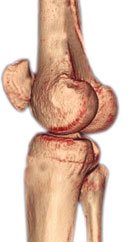
Dr. Shah is known for adopting and incorporating new & innovative techniques in Shalby Hospitals. The result of his tireless efforts & innovative spirit, is the introduction of ‘0’(Zero) Technique. This technique is much faster and the surgery time has been reduced to about 8-10 minutes, which is a revolution in the history of surgical science. Dr. Shah has established that TKR can actually be a minimally invasive procedure. It has been medically proven that less the time the patient spends in OT, lesser is the tissue trauma and quicker is the healing. Patients are assisted to walk within few hours of surgery to ensure maximum flexion of muscles and also as a confidence-building process.
At Shalby Hospitals, patients are treated under highly sterile conditions in ‘Class 100’ OTs that follows the strictest infection control standards. We have also pioneered the use of Surgical Space Suit worn by our knee replacement surgeons during the surgery to rule out even the minutest possibility of infection. Negative Air pressure in the OTs makes sure that the air outside the complex makes the OT completely sterile.
Salient Features of ZERO Technique in Knee Replacement:
- Quick Knee Surgery in 8 to 10 min
- Pre-planning of implant selection, instrument selection, anaesthesia, and pain management process
- Minimal incision = less exposure of body tissues
- Less hospital stay
- Painless
- Less consumption of medicines
- Less infection & side effects
- Less blood loss
- Assisted walk within few hours of surgery
- Less emotional & mental stress on patient & relatives
- Good flexion of the knee
- Use of superior quality implants (prosthesis)
- Dedicated team of Physiotherapists
- Quick post-surgical mobilization
- Knee Revision Surgery
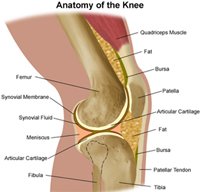
Knee Revision Surgery
Knee revision surgery, also known as Revision Total Knee Arthroplasty, is a procedure in which the previously implanted artificial knee joint, or prosthesis is removed. It is then replaced with a new implant or prosthesis. Knee revision surgery may also involve the use of bone grafts. The bone graft may be an auto-graft, which means that the bone is taken from another site in the patient’s own body; or an allograft, which means that the bone tissue comes from another donor.
Reasons for Knee Revision Surgery
A knee joint replacement may malfunction or fail due to one or many reasons, some of them are listed here…
- Aseptic loosening
- Wear of plastic
- Mal-alignment
- Unstable joint
Different types of Knee Replacement surgeries
There are two kinds of knee replacement surgeries, TKR (Total Knee Replacement) and P KR (Unicondylar/ Partial Knee Replacement). Knee Replacement surgery can be performed as a partial or a total knee replacement. In general, the procedure consists of replacing the diseased or damaged joint surfaces of the knee with metal or plastic components termed as an Implant or Prosthesis, that are shaped to allow continued motion of the knee joint.,
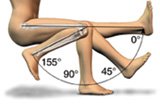
Partial Knee Replacement (PKR)
Partial Knee Replacement, also referred as Unicompartmental Knee Arthroplasty or Unicondylar Knee Arthroplasty, is a surgery that may be considered for treatment of osteoarthritis of the knee joint where a complete knee joint does not require replacement.
Conditions for Partial Knee Replacement
The partial knee surgery may be possible if arthritis in the knee is confined to a limited area. If the arthritis is widespread, then the partial knee replacement is not the solution. Patients undergo Total Knee Replacement for severe arthritis of the knee joint.
Total Knee Replacement (TKR)
In Total Knee Replacement, whole cartilage and bone is removed from the knee joint, and a single metal and plastic implant (prosthesis) is substituted. The surgeon replaces three parts of the knee joint.
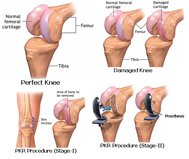
The two parts of the prosthesis are placed onto the ends of the femur, tibia, and under surface of the patella using special bone cement. Usually, metal is used at the end of the femur, and plastic is used on the tibia and patella for the new knee surface. However, surgeons are now using newer surfaces, including metal on metal or ceramic on ceramic.
Situations when TKR is helpful
- Pain that limits activities such as walking, climbing stairs and getting in and out of chairs, or even moderate or severe knee pain at rest.
- Restricted knee function or mobility, such as chronic knee stiffness and swelling that prevents one from bending and straightening the knee.
- Failure of other methods to improve symptoms, like resting, weight loss, physical therapy, a cane or other walking aid, medications, braces and surgery, etc.
- Knee deformity, such as a joint that bows in or out.
Reasons for Failure of Total Knee Replacement (TKR)
Like any other mechanical prosthesis (implant), knee implant also has a possibility of failure/malfunction. There are several reasons which may attribute to the failure of prosthesis. Some of the major ones are…
- Infection
- Aseptic loosening of the joint
- Plastic wear
- Mal-alignment or instability of the joint
- Bad quality of the implant
At Shalby Hospitals, under the expertise and guidance of Dr. Vikram Shah, the Total Knee Replacement procedures give excellent and incomparable results. The operation relieves pain and allows easy walking after full recovery.
Blog/Tips of the day
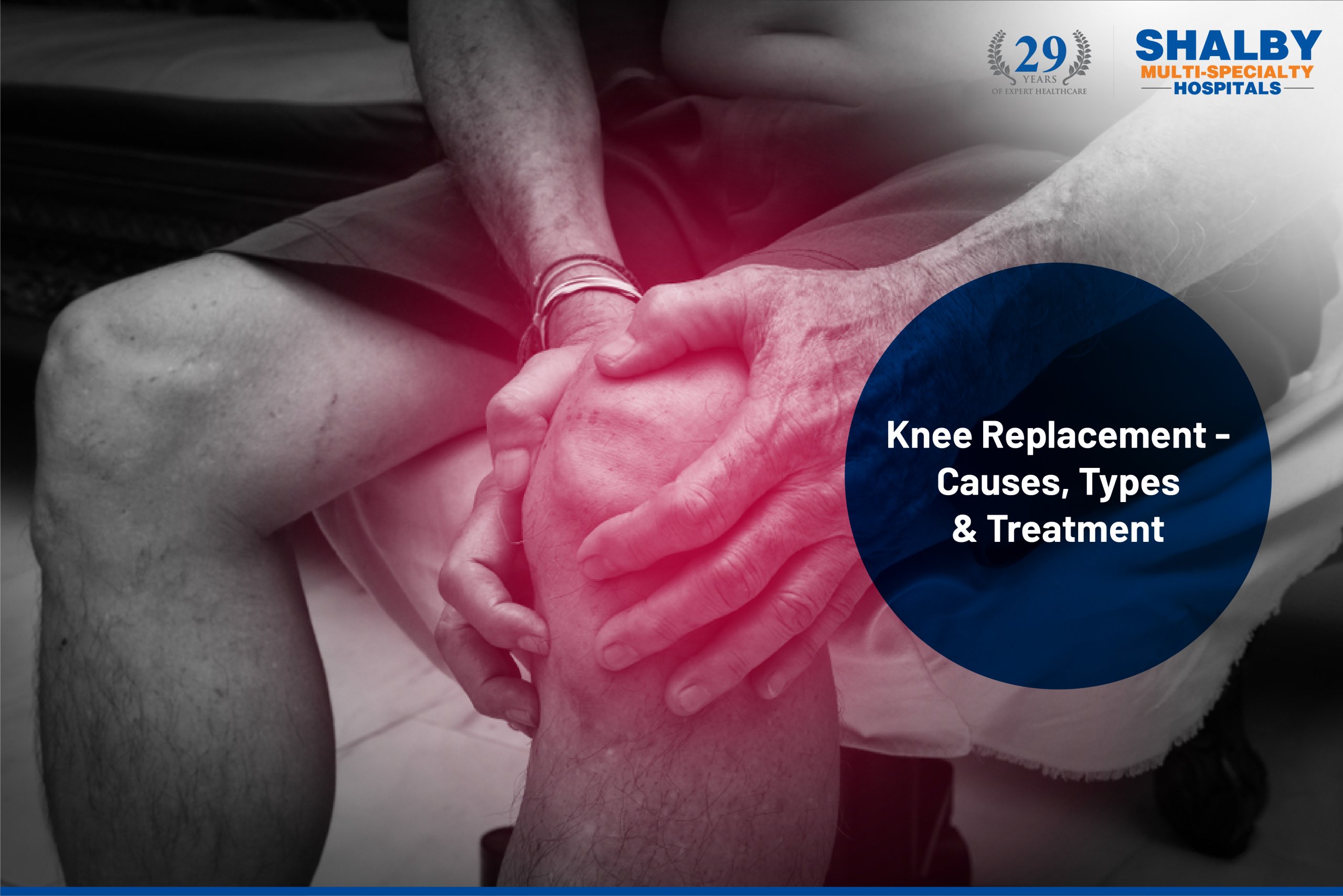
Knee Replacement – Causes, Types & Treatment
Millions of patients around the world have benefited from Joint Replacement (Arthroplasty) as a surgical treatment for end-stage arthritis. India, a nation of 1.4 billion, has a sizable population of people who suffer from hip and knee arthritis. What is Knee Replacement? With the help of knee replacement surgery, the... Read More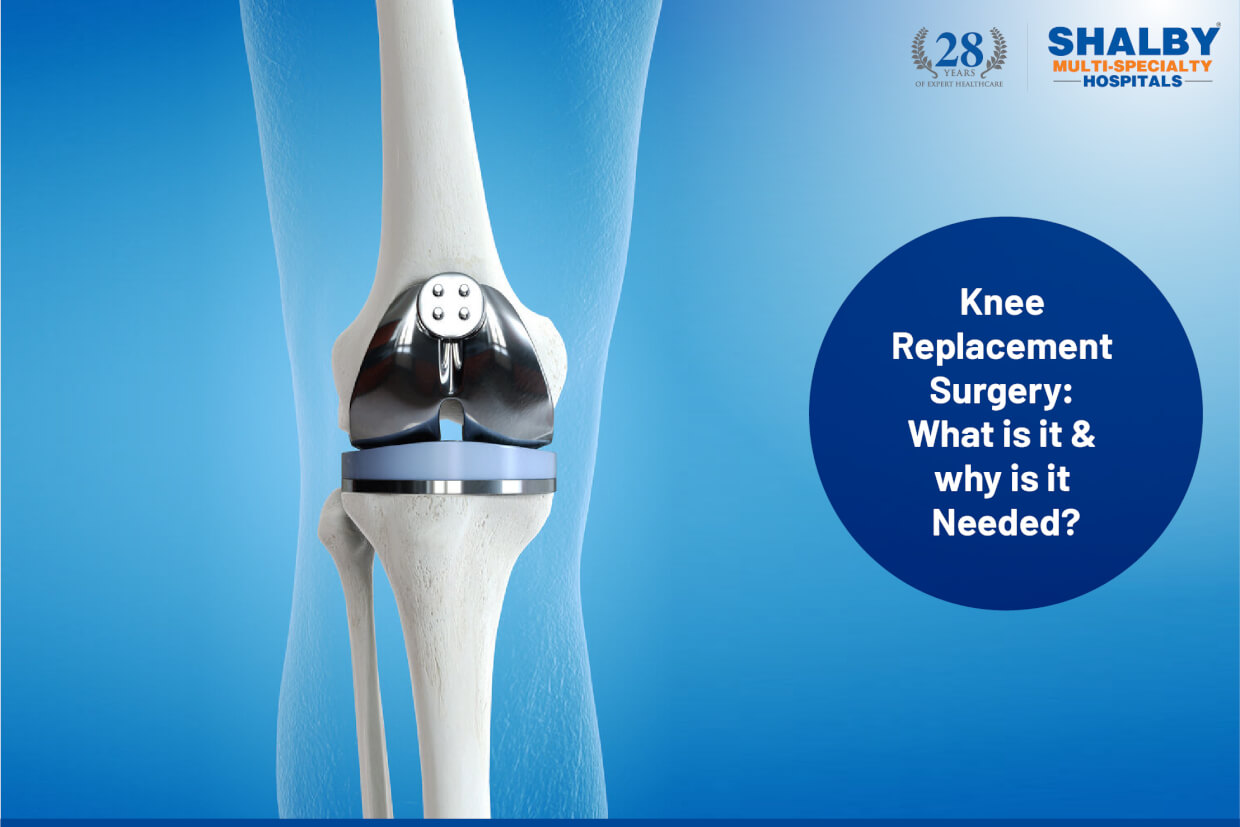
Knee Replacement Surgery: What is it and why is it Needed?
Knee replacement surgery or knee arthroplasty is a common surgical procedure to relieve knee pain and restore the function of the knees. During this procedure, the surgeon removes the damaged bone, and cartilage, and replaces it with an artificial joint or prosthesis. This prosthesis is made of metal alloys, polymers,... Read MoreShalby Hospital
Knee Joint Replacement
Center Of Excellence
- Arthroscopy – Sports Injury
- Ophthalmology and Glaucoma
- Oncosurgery
- Oncology
- Obstetrics and Gynaecology
- Obesity Surgery
- Neuro Science
- Neurosurgery
- Nephrology
- Orthopedic and Trauma
- Paediatric Orthopedics
- Spine Surgery
- Rheumatology
- Radiology and Imaging
- Pulmonology and Chest
- Plastic Surgery
- Paediatrics and Neonatology
- Pathology And Microbiology
- Maxillofacial Surgery
- Knee Joint Replacement
- ENT Surgery
- Endoscopy and Laparoscopy
- Endocrinology – Diabetology
- Emergency Medicine
- Dental Cosmetic and Implantology
- Cosmetic and Aesthetic
- Cardiothoracic and Vascular Surgery
- Cardiology
- Gastrointestinal Surgery
- Gastroenterology
- Intensive and Critical Care
- Infertility and IVF
- Infectious Diseases
- Hip Joint Replacement
- Liver Transplant
- Hair Transplant
- General Surgery
- General Medicine
- Uro Surgery
- Dermatology
- Arthroplasty
- Psychiatry
- Urology
- Anesthesia













